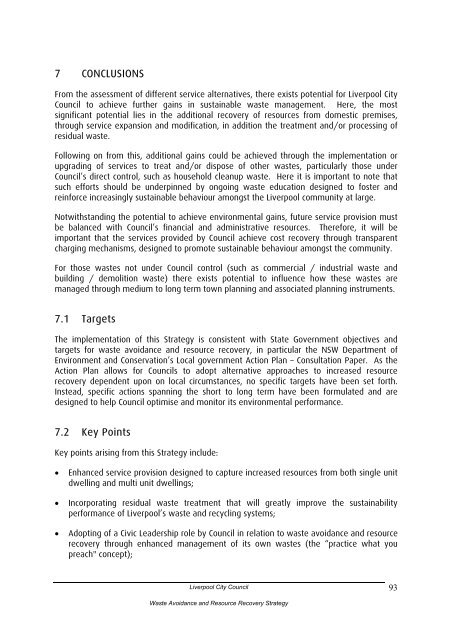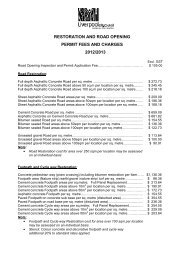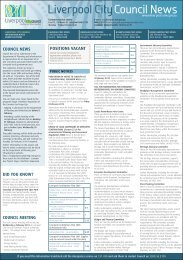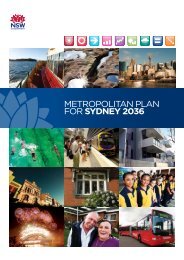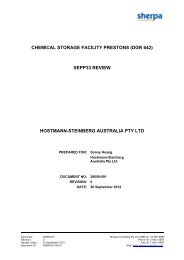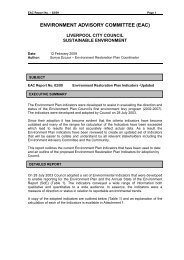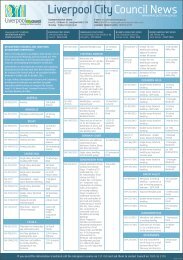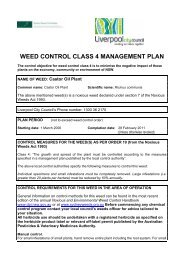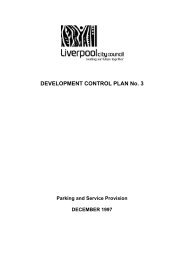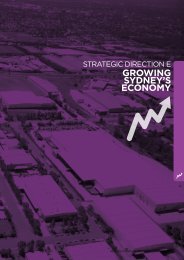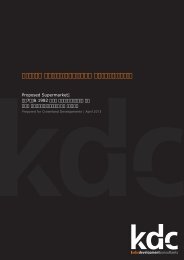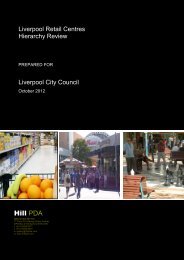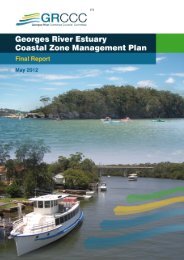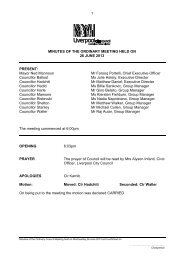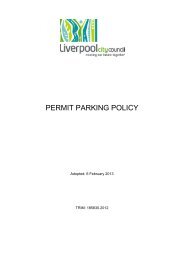to view the WARR Strategy. - Liverpool City Council - NSW ...
to view the WARR Strategy. - Liverpool City Council - NSW ...
to view the WARR Strategy. - Liverpool City Council - NSW ...
Create successful ePaper yourself
Turn your PDF publications into a flip-book with our unique Google optimized e-Paper software.
7 CONCLUSIONSFrom <strong>the</strong> assessment of different service alternatives, <strong>the</strong>re exists potential for <strong>Liverpool</strong> <strong>City</strong><strong>Council</strong> <strong>to</strong> achieve fur<strong>the</strong>r gains in sustainable waste management. Here, <strong>the</strong> mostsignificant potential lies in <strong>the</strong> additional recovery of resources from domestic premises,through service expansion and modification, in addition <strong>the</strong> treatment and/or processing ofresidual waste.Following on from this, additional gains could be achieved through <strong>the</strong> implementation orupgrading of services <strong>to</strong> treat and/or dispose of o<strong>the</strong>r wastes, particularly those under<strong>Council</strong>’s direct control, such as household cleanup waste. Here it is important <strong>to</strong> note thatsuch efforts should be underpinned by ongoing waste education designed <strong>to</strong> foster andreinforce increasingly sustainable behaviour amongst <strong>the</strong> <strong>Liverpool</strong> community at large.Notwithstanding <strong>the</strong> potential <strong>to</strong> achieve environmental gains, future service provision mustbe balanced with <strong>Council</strong>’s financial and administrative resources. Therefore, it will beimportant that <strong>the</strong> services provided by <strong>Council</strong> achieve cost recovery through transparentcharging mechanisms, designed <strong>to</strong> promote sustainable behaviour amongst <strong>the</strong> community.For those wastes not under <strong>Council</strong> control (such as commercial / industrial waste andbuilding / demolition waste) <strong>the</strong>re exists potential <strong>to</strong> influence how <strong>the</strong>se wastes aremanaged through medium <strong>to</strong> long term <strong>to</strong>wn planning and associated planning instruments.7.1 TargetsThe implementation of this <strong>Strategy</strong> is consistent with State Government objectives andtargets for waste avoidance and resource recovery, in particular <strong>the</strong> <strong>NSW</strong> Department ofEnvironment and Conservation’s Local government Action Plan – Consultation Paper. As <strong>the</strong>Action Plan allows for <strong>Council</strong>s <strong>to</strong> adopt alternative approaches <strong>to</strong> increased resourcerecovery dependent upon on local circumstances, no specific targets have been set forth.Instead, specific actions spanning <strong>the</strong> short <strong>to</strong> long term have been formulated and aredesigned <strong>to</strong> help <strong>Council</strong> optimise and moni<strong>to</strong>r its environmental performance.7.2 Key PointsKey points arising from this <strong>Strategy</strong> include:• Enhanced service provision designed <strong>to</strong> capture increased resources from both single unitdwelling and multi unit dwellings;• Incorporating residual waste treatment that will greatly improve <strong>the</strong> sustainabilityperformance of <strong>Liverpool</strong>’s waste and recycling systems;• Adopting of a Civic Leadership role by <strong>Council</strong> in relation <strong>to</strong> waste avoidance and resourcerecovery through enhanced management of its own wastes (<strong>the</strong> “practice what youpreach" concept);<strong>Liverpool</strong> <strong>City</strong> <strong>Council</strong>93Waste Avoidance and Resource Recovery <strong>Strategy</strong>


